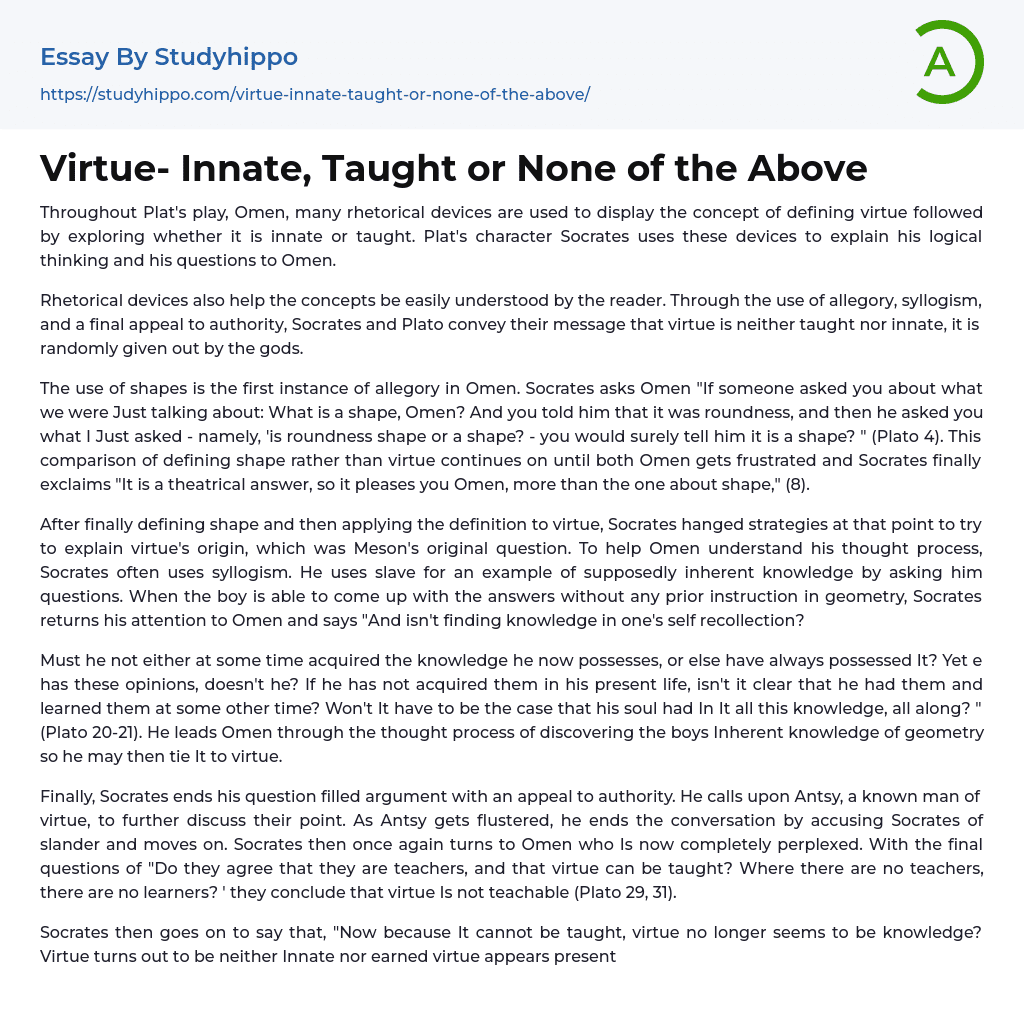Throughout Plat's play, Omen, many rhetorical devices are used to display the concept of defining virtue followed by exploring whether it is innate or taught. Plat's character Socrates uses these devices to explain his logical thinking and his questions to Omen.
Rhetorical devices also help the concepts be easily understood by the reader. Through the use of allegory, syllogism, and a final appeal to authority, Socrates and Plato convey their message that virtue is neither taught nor innate, it is randomly given out by the gods.
The use of shapes is the first instance of allegory in Omen. Socrates asks Omen "If someone asked you about what we were Just talking about: What is a shape, Omen? And you told him that it was roundness, and then he asked you what I Just asked - namely, 'is rou
...ndness shape or a shape? - you would surely tell him it is a shape? " (Plato 4). This comparison of defining shape rather than virtue continues on until both Omen gets frustrated and Socrates finally exclaims "It is a theatrical answer, so it pleases you Omen, more than the one about shape," (8).
After finally defining shape and then applying the definition to virtue, Socrates hanged strategies at that point to try to explain virtue's origin, which was Meson's original question. To help Omen understand his thought process, Socrates often uses syllogism. He uses slave for an example of supposedly inherent knowledge by asking him questions. When the boy is able to come up with the answers without any prior instruction in geometry, Socrates returns his attention to Omen and says "And isn't finding knowledge i
one's self recollection?
Must he not either at some time acquired the knowledge he now possesses, or else have always possessed It? Yet e has these opinions, doesn't he? If he has not acquired them in his present life, isn't it clear that he had them and learned them at some other time? Won't It have to be the case that his soul had In It all this knowledge, all along? " (Plato 20-21). He leads Omen through the thought process of discovering the boys Inherent knowledge of geometry so he may then tie It to virtue.
Finally, Socrates ends his question filled argument with an appeal to authority. He calls upon Antsy, a known man of virtue, to further discuss their point. As Antsy gets flustered, he ends the conversation by accusing Socrates of slander and moves on. Socrates then once again turns to Omen who Is now completely perplexed. With the final questions of "Do they agree that they are teachers, and that virtue can be taught? Where there are no teachers, there are no learners? ' they conclude that virtue Is not teachable (Plato 29, 31).
Socrates then goes on to say that, "Now because It cannot be taught, virtue no longer seems to be knowledge? Virtue turns out to be neither Innate nor earned virtue appears present In those who have It only as a gift from the gods," (Plato 34-35).
Virtue Is not cacheable nor Is everyone born with the knowledge. Antsy was one who was blessed with the gift of virtue. With many uses of rhetorical appeals throughout Omen, the use of allegory, syllogism, and an appeal to authority
stand out among the rest.
- Child essays
- Childcare essays
- Child labor essays
- Doll essays
- Adoption essays
- Aunt essays
- Babies essays
- Bedroom essays
- Caring essays
- Children essays
- Daughter essays
- Divorce essays
- Dog essays
- Dysfunctional Family essays
- Family Tradition essays
- Family Values essays
- Father essays
- Foster Care essays
- Friends essays
- Grandparent essays
- Home essays
- Hometown essays
- Husband essays
- Jealousy essays
- Love essays
- Marriage essays
- Mother essays
- Online Dating essays
- Parenting essays
- Parenting Teens essays
- Parents essays
- Relationship essays
- Room essays
- Sibling essays
- Sister essays
- Wedding essays
- Wife essays
- Accident essays
- Awareness essays
- Benefits of Volunteering essays
- Challenges essays
- Childhood Memories essays
- Decision essays
- Driving essays
- Event essays
- Excellence essays
- Expectations essays
- Failure essays
- Farewell essays
- Flight essays




